OpenAI, the publisher of ChatGPT, has removed a conversational agent, or “chatbot”, created to impersonate a candidate in the US presidential election online, thus imposing limits on the use of its artificial intelligence (AI) tools ) generative by political campaigns.
• Read also: Meta joins OpenAI and Google in the race for artificial general intelligence
A group supporting Dean Phillips, a member of the US Congress, asked a Miami-based start-up to create a chatbot that would allow users to chat with this little-known candidate.
“We recently removed a developer account that knowingly violated the rules of our API (application programming interface, editor’s note) and our platform, which prohibit political campaigns or the theft of a person’s identity without his consent,” OpenAI told the Washington Post on Saturday, which was the first newspaper to report this information.
The rise of generative AI has raised concerns that people could use ChatGPT and other similar tools to sow political chaos, including through disinformation or AI clones, in the run-up to several elections major events which will be held this year around the world.
As a leader in this technology, OpenAI, which is largely funded by Microsoft, is receiving particular attention.
The California-based company said last week it would provide users with resources to reduce the risk of damage.
The conversational robot called “Dean-bot” was intended to serve as an information tool as part of the campaign for the Democratic Party primaries. OpenAI was quick to remove it after an article in the Washington Post posted a link allowing it to be tested.
The political group behind the chatbot, We Serve Better (“We deserve better”), is co-directed by a former collaborator of Sam Altman, the boss of OpenAI, and received funds from investors from Silicon Valley, according to the American daily.
After the report was published, Delphi, the startup hired to create the robot, was excluded from OpenAI’s platform.
Delphi leverages OpenAI’s AI models to create “chatbots” capable of imitating the voices of personalities such as influencers or celebrities.
After the controversy, the company said it would now “prohibit any use of (its) platform by political figures or organizations.”
“We mistakenly believed that it would be acceptable, under OpenAI’s regulations, for a political action committee that supports Dean Phillips to create a clone of him with our tools,” Delphi said Sunday on X. “We apologized to OpenAI and We Serve Better for our mistake,” added the start-up.



